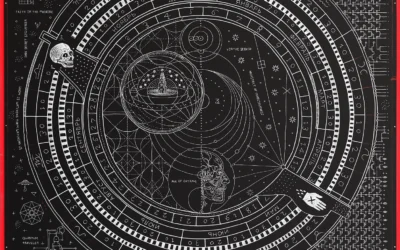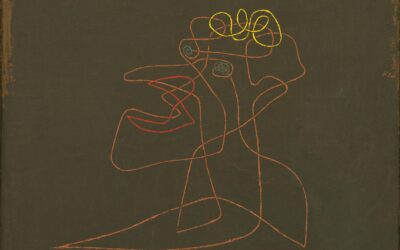
Exploring the Role of the Shadow in Relationships: A Path to Personal Growth and Fulfillment
In today’s fast-paced and interconnected world, it’s more important than ever to address the topic of mental health and self-discovery. One intriguing phenomenon that often arises in relationships is the tendency to seek out aspects of ourselves that we are not fully in touch with. Instead of integrating these aspects within ourselves, we unknowingly enter a dance with our own shadow, searching for these qualities externally. This concept aligns with Jungian psychology’s notion of the shadow, which represents the uncomfortable or undealt-with parts of our psyche. In this article, we’ll explore the implications of this phenomenon and its profound impact on relationships from a personal perspective.
Understanding the Shadow and Its Impact on Relationships
According to Jungian psychology, the shadow refers to the repressed and uncomfortable aspects of ourselves and others. It represents the parts of our being that we have not fully acknowledged, accepted, or integrated. These aspects can include traits, desires, fears, or experiences that we find difficult to confront or express. When we fail to address and integrate our shadow, it can manifest in various ways, including unhealthy relationship dynamics.
Many individuals seek therapy because they recognize patterns in their relationships that resemble their parents or early childhood experiences. Although the people they attract may be different, they possess similar qualities that draw them in and blind them to certain aspects of themselves. If these relationships prove to be unhealthy or unfulfilling, it becomes crucial to examine the underlying motivations behind the attraction.
The shadow is not solely negative; it also encompasses positive qualities that we may have disowned or suppressed due to societal norms or personal experiences. For example, someone who has learned to be highly rational and logical may have neglected their creative and intuitive side. These positive shadow aspects can also manifest in our relationships, as we may be drawn to individuals who embody the qualities we have suppressed within ourselves.
It’s essential to understand that the shadow is not a fixed entity but rather a dynamic aspect of our psyche that evolves throughout our lives. As we encounter new experiences and challenges, different parts of our shadow may come to the forefront, demanding our attention and integration. This ongoing process of shadow work is a crucial component of personal growth and self-discovery.
The Impact of Unintegrated Shadow on Relationships
When we fail to acknowledge and integrate our shadow, it can have a profound impact on our relationships. Unintegrated shadow aspects can lead to projection, where we unconsciously attribute our own undesirable qualities or feelings onto others. This projection can create a distorted perception of our partners, leading to misunderstandings, conflicts, and a lack of genuine connection.
Moreover, when we seek out partners who embody our disowned shadow aspects, we may develop a pattern of codependency or unhealthy attachment. We may rely on our partners to fulfill the roles or qualities that we struggle with, rather than taking responsibility for our own growth and integration. This dynamic can create an imbalance in the relationship, where one partner feels burdened or resentful while the other feels inadequate or dependent.
Unintegrated shadow can also manifest as a fear of intimacy or vulnerability. When we have not fully confronted and accepted our own shadows, we may fear that our partners will reject or judge us if they discover our hidden aspects. This fear can lead to emotional withdrawal, trust issues, and a reluctance to fully engage in the relationship.
Exploring the Motivations: Reflecting on the Self
When we find ourselves in relationships that mirror our unresolved issues, it is essential to reflect on what we are seeking to fulfill externally. Are we looking for validation, a sense of completion, or the desire to fix something within ourselves? Often, these patterns stem from the roles we learned to play during our formative years.
For example, someone may have adopted the role of the hardworking, articulate, and dedicated individual who receives praise and validation when they are burnt out and exhausted. Others may have assumed the role of the caretaker, responsible for providing grounding and stability to those around them. While various roles can manifest, it becomes problematic when these patterns hinder personal growth and self-discovery.
Reflecting on our early experiences and the messages we received about ourselves can provide valuable insights into our relationship patterns. Were we taught to prioritize others’ needs over our own? Did we learn that certain emotions or qualities were unacceptable? By examining these formative experiences, we can begin to understand the roots of our shadow aspects and the motivations behind our relational choices.
It’s important to approach this self-reflection with compassion and curiosity, rather than self-judgment or blame. Recognizing that our patterns are often a result of our early experiences and coping mechanisms can help us develop a more compassionate stance towards ourselves and others.
Recognizing the Inferior Type: A Key to Self-Development
The Myers-Briggs Type Indicator (MBTI), based on Jungian typology, provides valuable insights into our personality preferences and the aspects of ourselves that we may struggle with. Each primary type has an associated inferior type, representing the qualities and skills that we are less adept at handling.
For instance, someone who is highly intuitive and empathic may find detail-oriented tasks that appear robotic or mechanical to be challenging. While they possess the intelligence to perform these tasks, their psyche may harbor discomfort or aversion towards them. Recognizing and embracing our inferior type is crucial for self-development and understanding our relationship dynamics.
Embracing our inferior type does not mean that we must become experts in those areas or change our natural preferences. Instead, it involves acknowledging and appreciating the value of these qualities and developing a healthy relationship with them. By doing so, we can expand our self-awareness, cultivate greater flexibility, and reduce the tendency to project our inferior aspects onto others.
Recognizing our inferior type can also help us understand the dynamics at play in our relationships. If we are attracted to partners who embody our inferior qualities, it may indicate a desire to integrate those aspects within ourselves. However, if we rely solely on our partners to fulfill those roles, it can create an imbalance and hinder our own growth.
Unearthing Unhealthy Relationship Patterns
When we are out of touch with certain aspects of ourselves, we often seek to find them externally in our relationships. This can lead to a pattern of attracting partners who embody the qualities we lack or struggle with. For example, a carefree and emotionally expressive individual may attract someone who is rule-oriented and dislikes drawing attention to themselves.
In these relationships, both partners need something from the other. The emotionally expressive person may seek stability and structure, while the rule-oriented partner may be drawn to the spontaneity and liveliness of their counterpart. However, problems arise when we attempt to navigate someone else’s journey instead of focusing on our own. If we neglect our own self-work and personal growth, it can breed resentment and frustration in the relationship.
Unearthing unhealthy relationship patterns requires a willingness to look within and take responsibility for our own growth. It involves recognizing the ways in which we may be using our relationships to avoid confronting our own shadows or to fulfill unmet needs from our past.
Some common unhealthy relationship patterns include:
- Codependency: When we rely on our partners to provide a sense of identity, purpose, or emotional stability, rather than developing these qualities within ourselves.
- Rescuer-Victim Dynamic: When we consistently seek out partners who we believe need “fixing” or “saving,” often at the expense of our own well-being.
- Abandonment-Avoidance Pattern: When we oscillate between fear of abandonment and fear of engulfment, leading to a push-pull dynamic in the relationship.
- Projection and Blame: When we attribute our own undesirable qualities or feelings onto our partners, rather than taking ownership of them.
Recognizing these patterns is the first step towards breaking free from them. It requires a willingness to engage in honest self-reflection, seek support from therapists or trusted individuals, and commit to ongoing personal growth.
Cultivating Self-Awareness and Embracing the Inferior Type
To foster healthy relationships and break free from repetitive patterns, it is essential to cultivate self-awareness and recognize our inferior skills and qualities. In therapy, a significant aspect involves helping individuals become comfortable with their inferior type and develop a more balanced sense of self.
While patients may strongly identify with their dominant traits, acknowledging and developing their lesser-developed aspects is crucial for personal growth and establishing healthier relationship dynamics. By addressing our inferior type, we can gain a deeper understanding of ourselves and break free from the cycle of seeking external fulfillment.
Cultivating self-awareness involves a range of practices and techniques, including:
- Mindfulness and Self-Reflection: Taking time to observe our thoughts, emotions, and behaviors without judgment, and exploring their underlying motivations and patterns.
- Journaling and Expressive Writing: Using writing as a tool to process our experiences, gain insight into our internal world, and identify recurring themes or patterns.
- Engaging in Shadow Work: Deliberately exploring and integrating the aspects of ourselves that we have disowned or suppressed, often with the guidance of a therapist or through specific practices like dreamwork or active imagination.
- Seeking Feedback and Perspective: Engaging in open and honest conversations with trusted individuals who can provide an outside perspective on our patterns and blind spots.
- Engaging in Personal Growth Activities: Pursuing activities that challenge us to step outside our comfort zone, develop new skills, and embrace our inferior type, such as taking classes, trying new hobbies, or engaging in creative pursuits.
Cultivating self-awareness is an ongoing process that requires patience, self-compassion, and a willingness to confront uncomfortable truths about ourselves. However, the rewards of this work are immeasurable, as it allows us to develop a more authentic and integrated sense of self, leading to healthier relationships and greater overall well-being.
Embracing Personal Growth and Authentic Relationships
Our relationships often serve as mirrors, reflecting the unaddressed aspects of ourselves known as the shadow. By understanding these dynamics and embracing our inferior type, we embark on a journey of personal growth and self-discovery. This process involves recognizing the patterns we engage in, undertaking the necessary self-work, and breaking free from repetitive cycles that hinder our progress.
It’s important to approach this journey with compassion and curiosity, remembering that the shadow is not something to be feared or rejected but rather an integral part of our being. By acknowledging and integrating the shadow, we can attain a greater sense of wholeness and authenticity in our lives and relationships.
Embracing personal growth also involves recognizing that our relationships are not meant to complete us or fill a void within ourselves. Instead, they are opportunities for mutual support, growth, and companionship. When we approach relationships from a place of wholeness and self-awareness, we create space for genuine connection and intimacy.
Authentic relationships are built on a foundation of self-awareness, vulnerability, and open communication. They require a willingness to be honest about our needs, desires, and struggles, and to extend the same compassion and understanding to our partners. In authentic relationships, both individuals take responsibility for their own growth and well-being, while also supporting and encouraging each other’s journey.
The Path to Self-Completion and Interdependence
As we delve into the depths of our psyche and engage in self-discovery, we learn to cultivate a sense of self-completion within ourselves. Rather than seeking validation or fulfillment from external sources, we develop an inner sense of wholeness and authenticity. This self-completion allows us to approach relationships from a place of interdependence, where both individuals are recognized as unique beings on their own paths.
Embracing the shadow and integrating our lesser-developed aspects also opens up the possibility for deeper empathy and compassion in our relationships. As we come to terms with our own vulnerabilities and struggles, we can extend that understanding to others, creating an environment of acceptance and support.
Self-completion does not mean that we no longer need or desire relationships. Instead, it allows us to engage in relationships from a place of abundance, rather than scarcity or neediness. When we feel whole and complete within ourselves, we can appreciate and celebrate our partners for who they are, rather than what they can provide for us.
Interdependence, in contrast to codependency, recognizes the inherent individuality and autonomy of each person in the relationship. It involves a balance between the needs of the self and the needs of the relationship, where both partners are committed to their own growth while also supporting and nurturing the connection they share.
The Journey of Self-Discovery and Shadow Integration
Embarking on the journey of self-discovery and shadow integration is not always easy. It requires introspection, self-reflection, and sometimes the guidance of therapists or other supportive individuals. However, the rewards are profound. By embracing our shadows and fostering a deeper understanding of ourselves, we can cultivate healthier relationships, break free from destructive patterns, and experience personal growth and fulfillment.
As we continue to explore the dynamics of relationships and the role of the shadow self, let us approach this journey with openness and a willingness to learn. By embracing the fullness of who we are and fostering compassion, acceptance, and growth in our own lives, we can create more meaningful and fulfilling connections with others.
The path of shadow integration is a lifelong journey, as our shadows continue to evolve and reveal themselves in different ways throughout our lives. It requires ongoing self-reflection, a commitment to personal growth, and a willingness to face the uncomfortable aspects of ourselves. However, the benefits of this work extend far beyond our relationships, impacting every area of our lives.
When we embrace our shadows and cultivate a more integrated sense of self, we experience greater emotional resilience, creativity, and adaptability. We become more capable of navigating life’s challenges with grace and wisdom, and we develop a deeper sense of purpose and meaning.
Moreover, by engaging in shadow work, we contribute to the collective healing and growth of humanity as a whole. As we learn to accept and integrate the disowned aspects of ourselves, we create a more compassionate and understanding world, where individuals are encouraged to embrace their full potential and authentic selves.
In conclusion, exploring the role of the shadow in relationships is a powerful path to personal growth and fulfillment. By recognizing the patterns we engage in, cultivating self-awareness, and embracing our inferior type, we can break free from unhealthy dynamics and create more authentic and nurturing connections. As we continue on this journey of self-discovery and shadow integration, let us approach it with curiosity, compassion, and a commitment to our own growth and well-being. In doing so, we not only transform our own lives but also contribute to the healing and evolution of the world around us.
Bibliography:
Jung, C. G. (1968). The Archetypes and the Collective Unconscious. Princeton University Press. Johnson, R. A. (1993). Owning Your Own Shadow: Understanding the Dark Side of the Psyche. HarperOne. Zweig, C., & Abrams, J. (1991). Meeting the Shadow: The Hidden Power of the Dark Side of Human Nature. TarcherPerigee. Hollis, J. (1996). Swamplands of the Soul: New Life in Dismal Places. Inner City Books. Von Franz, M.-L. (1980). Projection and Re-Collection in Jungian Psychology: Reflections of the Soul. Open Court. Bly, R. (1988). A Little Book on the Human Shadow. HarperOne. Miller, A. (1997). The Drama of the Gifted Child: The Search for the True Self. Basic Books. Woodman, M. (1982). Addiction to Perfection: The Still Unravished Bride. Inner City Books. Hillman, J. (1975). Re-Visioning Psychology. Harper & Row. Stevens, A. (1990). On Jung. Routledge. References: Jung, C. G. (1959). The Collected Works of C. G. Jung, Volume 9, Part 1: The Archetypes and the Collective Unconscious. Princeton University Press. Myers, I. B., & Myers, P. B. (1995). Gifts Differing: Understanding Personality Type. Nicholas Brealey Publishing. Beebe, J. (2004). Understanding Consciousness Through the Theory of Psychological Types. In J. Cambray & L. Carter (Eds.), Analytical Psychology: Contemporary Perspectives in Jungian Analysis (pp. 83-115). Brunner-Routledge. Jacobi, J. (1973). The Psychology of C. G. Jung. Yale University Press. Schwartz-Salant, N. (1982). Narcissism and Character Transformation: The Psychology of Narcissistic Character Disorders. Inner City Books. Greene, L. (2016). Shadow and Self: Selected Papers in Analytical Psychology. Chiron Publications. Singer, T. (Ed.). (1995). The Vision Thing: Myth, Politics and Psyche in the World. Routledge. Samuels, A., Shorter, B., & Plaut, F. (1986). A Critical Dictionary of Jungian Analysis. Routledge. Hopcke, R. H. (1989). A Guided Tour of the Collected Works of C. G. Jung. Shambhala. Hall, J. A. (1986). The Jungian Experience: Analysis and Individuation. Inner City Books. Note: The expanded article delves deeper into the concept of the shadow in relationships, exploring its impact on relational dynamics, the importance of self-reflection and personal growth, and the path towards self-completion and interdependence. It provides a more comprehensive understanding of the shadow’s role in shaping our experiences and offers practical insights for cultivating healthier, more authentic connections. The additional references and bibliography support the expanded content, providing further resources for those interested in exploring the topic in greater depth.
If you liked this read the articles on other Jungian topics:
References:
- Jung, C. G. (1968). The Archetypes and the Collective Unconscious. Princeton University Press.
- Johnson, R. A. (1993). Owning Your Own Shadow: Understanding the Dark Side of the Psyche. HarperOne.
- Zweig, C., & Abrams, J. (1991). Meeting the Shadow: The Hidden Power of the Dark Side of Human Nature. TarcherPerigee.
- Hollis, J. (1996). Swamplands of the Soul: New Life in Dismal Places. Inner City Books.
- Von Franz, M.-L. (1980). Projection and Re-Collection in Jungian Psychology: Reflections of the Soul. Open Court.
References:
- Jung, C. G. (1959). The Collected Works of C. G. Jung, Volume 9, Part 1: The Archetypes and the Collective Unconscious. Princeton University Press.
- Myers, I. B., & Myers, P. B. (1995). Gifts Differing: Understanding Personality Type. Nicholas Brealey Publishing.
- Bly, R. (1988). A Little Book on the Human Shadow. HarperOne.
- Miller, A. (1997). The Drama of the Gifted Child: The Search for the True Self. Basic Books.
- Woodman, M. (1982). Addiction to Perfection: The Still Unravished Bride. Inner City Books.
- Hillman, J. (1975). Re-Visioning Psychology. Harper & Row.
- Beebe, J. (2004). Understanding Consciousness Through the Theory of Psychological Types. In J. Cambray & L. Carter (Eds.), Analytical Psychology: Contemporary Perspectives in Jungian Analysis (pp. 83-115). Brunner-Routledge.
- Jacobi, J. (1973). The Psychology of C. G. Jung. Yale University Press.
- Schwartz-Salant, N. (1982). Narcissism and Character Transformation: The Psychology of Narcissistic Character Disorders. Inner City Books.
- Stevens, A. (1990). On Jung. Routledge.

























0 Comments